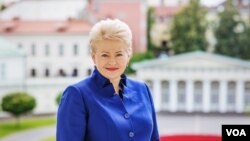In Lithuania, July is the season of song festivals but the country’s newly re-elected president, Dalia Grybauskaite, sees little harmony with her massive neighbor to the east: Russia.
“Now, we see aggressive rhetoric, aggressive behavior, aggressive propaganda, and informational wars,” she noted.
'Great Russian chauvinism'
Russia’s annexation of Ukraine’s Crimea region has unnerved neighbors from Kazakhstan in the south to the Baltic states in the northwest. In an interview with VOA, Grybauskaite warned of a "great Russian chauvinism" within the Kremlin that is fueling the pro-Russian separatist rebellion in Ukraine.
“The great Russian chauvinism, which is now increasing in Russia, mainly very much depends on the elite, who are trying to revive it. And this is very dangerous," she said. "So I['m] not much sure it will be over in five years, because it will surely be specific to President [Vladimir] Putin.”
Both Grybauskaite and Putin have black belts in karate. Some feel that the Russian president may have met his Baltic match - on the verbal level, at least.
On Saturday, Grybauskaite is to be inaugurated president for a second five-year term. As president of Lithuania, the largest of the three Baltic states, she is expected to take the lead in countering Russia’s regional ambitions. All three Baltic nations - including Estonia and Latvia -- are members of the European Union and of NATO.
The Lithuanian president warns that interference in Ukraine this year marks a dangerous turn in modern Russia’s relations with its neighbors.
“It is very worrying. And it looks like it’s not over. The same methods that are now used in Eastern Ukraine -- the same threats, at least not directly military yet, but informational, cyber. Propaganda wars already we are feeling ourselves in the Baltic states [and] Poland, for example. The military exercises also we do have on our borders, in the Kaliningrad region,” Grybauskaite said.
Ukraine, along with the United States and its European allies, have accused Russia of allowing fighters and weapons to reach the pro-Russian rebels in eastern Ukraine, a charge Moscow has denied. Russia's government also defends its annexation of Crimea earlier this year, saying it followed what it has called a legal referendum in which Crimeans voted overwhelmingly to join Russia. Both Kyiv and the West have condemned the vote as illegitimate and in violation of international law.
The president said she has no doubt Russia has supplied sophisticated weapons to the pro-Russian rebels in eastern Ukraine. “Some terrorist groups are supplied with military equipment, clearly of Russian origin, and clearly not from the market," she noted. "But specially provided, and very expensive also.”
As in eastern Ukraine, the Baltics are home to a large Russian-speaking population. They have 1 million Russian speakers, or 15 percent of the total population.
Russia's annexation of Ukraine's Crimea
President Grybauskaite sharply criticized the Kremlin’s moves to act against neighboring countries in the name of defending Russian speakers beyond Russia’s borders. She compared this policy to war justifications made by Germany prior to World War II.
“We are seeing methods that have been used in the ‘30s of the last century starting to be used now in the 21st century," she stated.
She said Russia’s annexation of Ukraine’s Crimea woke up NATO. Since then, NATO troops have been rotating through the Baltics, training with local military.
Lithuania’s leader said that her country is raising defense spending, aiming to soon hit NATO’s standard of 2 percent of a country's gross domestic product.
Lithuania is also working to cut its dependency on Russia for all its natural gas.
In December, a ship with liquefied natural gas is scheduled to dock in the Lithuanian port city of Klaipeda. The ship has the capacity to import more than enough gas to meet all of Lithuania’s needs.
To further cut dependency on Russian pipeline gas, Lithuania’s president urged Washington to approve exports of gas from the United States. Such a move would have political benefits, she said.
“Today, we see America has responsibility, a quite global one, on security, on democracy, on peace. Energy is one of the tools to secure the peace, without military interventions. And instead of sending troops, you can send the gas, and you will do the same, you will secure the peace in the world,” said Grybauskaite.
By cutting gas dependency on Russia and by strengthening defensive alliances with the West, Lithuania’s president seeks to preserve her nation’s independence in the face of Russia’s newly flexed muscle in the region.




